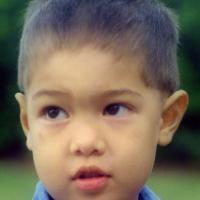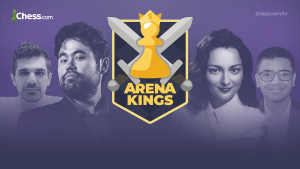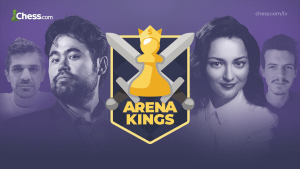
Chess Child: America's Youngest Grandmaster
As an active member of the U.S. chess scene, I of course know of Ray Robson, currently the youngest Grandmaster in the country at 16. In fact, as an active tournament player I have even had the chance to meet him, and play ping pong and chess with him. Just as great a pleasure was meeting his father, Gary Robson, a very kind and intelligent man. So when I heard that Gary had written a book about raising Ray, I immediately knew I had to read it.
I've just ordered my copy of the book, Chess Child, but I wanted to immediately share some reviews with the chess.com community as well. As a bonus to ordering the book, Gary promises he will use all proceeds from the book to help Ray develop as a chess player --> we get to see him play more!! Ray is a great asset to the chess community, and I suggest everyone keep their eye on this young man's rise.
For more info or to order a copy, go to www.NipaHutPress.com .
Here are the reviews:
By Rick Kennedy, Book Reviewer
Above all else, and its greatest, transcendent, strength, Chess Child is the story about a father’s love for his son, and the lengths that he will go to help, guide, support and buffer the growing boy in his quest to be as good as he can be in something that he shows great promise for.
Perhaps chess parents will page through this book looking for Gary’s “secrets” for raising a chess genius. (There is very little concrete “chess content” as it applies to, say, playing the Najdorf Sicilian or finessing the Catalan Opening.) Let me be a spoiler: kind, loving words; walks and talks; throwing the football around, wrestling and having fun. Most of all: sharing a sense of perspective.
It is impressive how little of Chess Child is negative, and how little of that is personal. The author is not out to settle scores, right wrongs, dish dirt. He is too busy for that.
The other, more important, part involved having another human being in my life who I could so closely connect with, admire, teach, and support. If every action and decision that I made brought me to where I am now, then I must have a charmed life. Regrets? Not a single one.
Chess Child is a well-written, well laid out, self-published tale that turns out to be an intriguing grabber of a book. It should appeal to anyone interested in a story about raising a chess player, raising this particular Grandmaster, or just raising a really neat child. As the dad to three "Kennedy Kids" (none of whom will get anywhere near master level), I loved all of those perspectives.
By Dr. Daniel Kain, Northern Arizona University
Chess Child, Dr. Robson’s first book, is as much about education, schooling, parenting, and a philosophy of life, as it is about Ray’s development. And it’s a fascinating read.
I was skeptical that an account of chess playing would be of interest beyond the world of chess aficionados. I was wrong. Chess Child is the sort of book that has broad relevance and appeal and reminds us all of the importance of family and hard work, of embracing one’s values, and ultimately of the importance of living a better life. As Robson puts it,
Chess is a game. You play games, and you have fun. If you reach the end of it all and it’s no longer a game and you find that you didn’t have fun all along the way, why then you’ve missed the point entirely.
The goal is to live a better life, which, to me, is synonymous with living more wisely.
Chess Child provides both the fun of the journey and the wisdom we need. It’s well worth the read.
By John Donaldson, International Master
Chess Child may initially remind many of Fred Waitzkin's Searching for Bobby Fischer. Both are great father-son stories and each traces the development of a young boy from a chess novice to strong player. Along the way each family is forced to make sacrifices and find their own way with no guarantees as to how things will end. Both fathers start out with no knowledge of the chess world and have to figure things out along the way with no maps or books to guide them.
While there are similarities between the two stories there are also important differences. One major one is that the Robson family lives near Tampa, a semi-desert for chess compared to the Waitzkins who were based in Manhattan. While Josh had the advantage of living in the center of American chess near both the Marshall and Manhattan Chess clubs, Ray's club was the Internet. Despite all his hard work and gift for the game it is unlikely that a player the strength of Ray would have emerged from Central Florida 20 years.
Not only were all the opportunities that the Internet allows not available then, nor were ChessBase and Rybka/Fritz not to mention strong coaches. The latter was a key in Ray’s development. Gary Robson writes movingly of the difficulties of finding the right person to help his son at the right time. This coach not only has to possess the necessary chess information and the ability to communicate it but also achieve the right rapport with young Ray.
Chess Child will be an interesting read for a wide audience, particularly parents of young chess talents looking for guidance.
By Harvey Lerman, Tournament Director
Robson keeps detailed journals of his thoughts and his son’s activities. As Robson introduces his son to more and more complex ideas and activities, which Ray absorbs as quickly as he can, Gary is creating his journals. When introduced to the game of chess at the age of 3, Ray’s mind demands that solutions be found. Gary has found his goal and spends all of his time in carefully introducing Ray to the world in general, and chess in particular, from an “Eastern” point of view.
If you know the Robsons, buy this book . . . you’d find you don’t know them at all. Even if you don’t know the Robsons, but have a child that you wish to develop to his/her fullest potential, buy this book; you wouldn’t be sorry.



